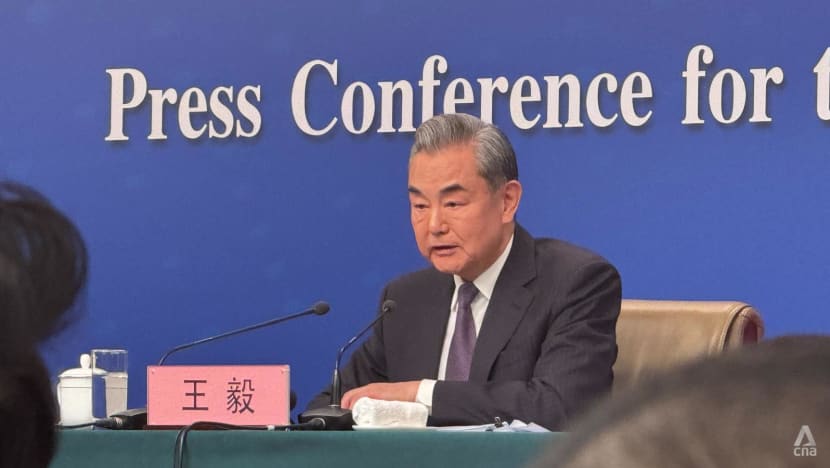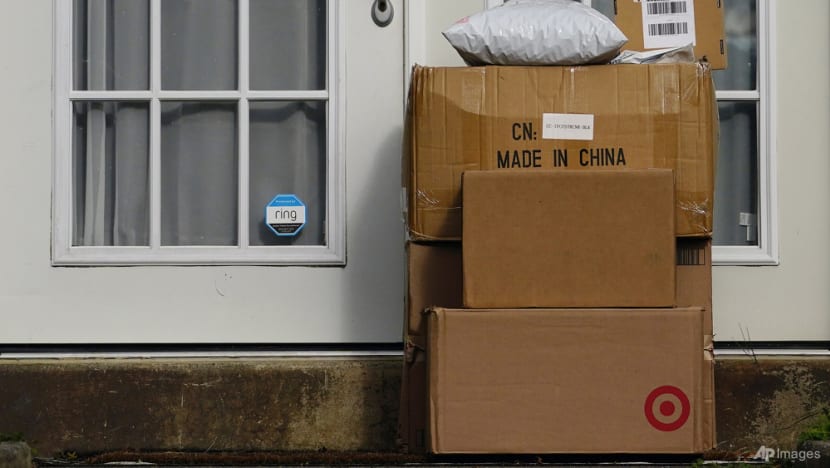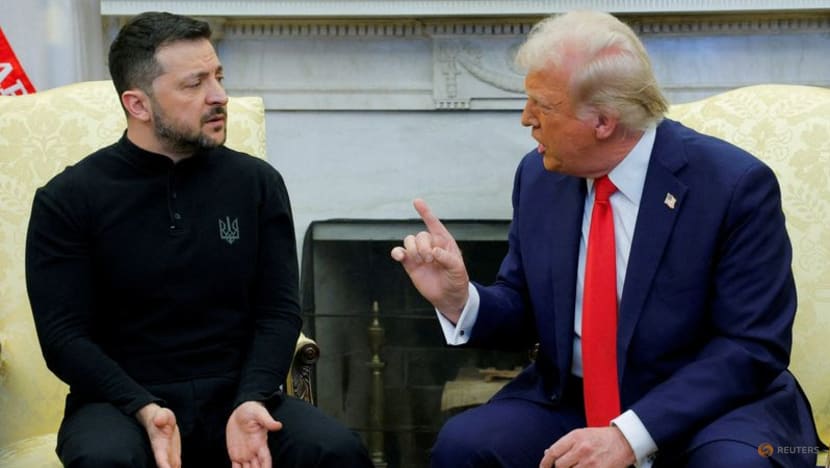‘Might is right’ mindset among major powers could hurt small countries most, warns China’s Wang Yi
The remarks by China’s top diplomat on Friday (Mar 7) come as the United States under Donald Trump trots out expansionist rhetoric.

Chinese Foreign Minister Wang Yi speaking at a press conference on the sidelines of the National People's Congress in Beijing, China on Mar 7, 2025. (Photo: CNA/Lee Gim Siong)

This audio is generated by an AI tool.
BEIJING: If big countries operate on a “might is right” basis, it will severely damage the world order and usher in the law of the jungle, with smaller and weaker countries suffering the brunt, China’s Foreign Minister Wang Yi said on Friday (Mar 7), in a veiled reference to the United States.
“Major powers should shoulder international responsibilities and fulfill their global commitments. They should not be driven solely by self-interest, nor should they bully the weak with their strength,” Wang said in a press conference on the sidelines of the Two Sessions political gatherings.
He was responding to questions on Washington’s exit from international responsibilities and the opportunities it offers China, as well as the threats that the global order is facing now.
The US has been casting doubt on international institutions and withdrawing from UN bodies such as the World Health Organization and the UN Human Rights Council.
At the same time, Trump has trotted out expansionist rhetoric, expressing ambitions to acquire Greenland, the Panama Canal and Canada on the grounds of national security.
"First and foremost, the foundation of sovereignty equality must be built on the equal will of the international community. We cannot allow the strong to dominate and decide everything based on their own power,” Wang said.
“Major powers, in particular, should lead by example in upholding integrity and the rule of law, opposing double standards and selective application, and should never engage in bullying, market manipulation, or plunder."
Wang pointed to the close China-Russia relationship as an example of how great-power relations should be, noting that both sides have explored a way of co-existence that is non-aligned, non-confrontational and not directed at any third party.
Describing the bilateral relationship as “mature, resilient and stable”, Wang said this would not be affected by “temporary events” and “third-party interference”.
“It serves as a measure in a turbulent world, not as a variable in geopolitical games,” said the veteran diplomat.
Chinese President Xi Jinping praised Beijing’s close ties with Moscow in a Feb 24 call with Russian President Vladimir Putin.
He said "history and reality" demonstrate the two nations are “good neighbours that cannot be moved away, and true friends who share weal and woe, support each other and achieve common development”, reported Chinese state news agency Xinhua.
“NOT THE BEHAVIOUR OF A RESPONSIBLE WORLD POWER”
In the press conference that lasted for about 90 minutes, Wang also hit out directly at the US for not behaving as a major power in their worsening trade war.
“The United States should not repay kindness with resentment, nor should it impose tariffs without reason. This is not the behaviour of a responsible major power,” said Wang, who also heads the Central Foreign Affairs Commission of China’s Communist Party.
Chinese goods are currently under an extra cumulative 20 per cent blanket US tariffs, after Washington’s latest 10 per cent salvo came into effect on Tuesday.

China retaliated immediately, slapping 10 to 15 per cent levies on US food and farm products like chicken, corn and cotton. It also imposed export and investment curbs on 25 US firms on the grounds of national security.
The levies are expected to hit hundreds of billions of dollars in total trade between the world's two largest economies.
"China-US economic and trade relations are reciprocal and equitable. If cooperation is chosen, mutual benefits and win-win outcomes can be achieved. However, if pressure is relentlessly applied, China will resolutely counteract,” Wang warned.
The veteran diplomat further emphasised that respect is a “basic norm” governing state-to-state relations and an important prerequisite for China-US relations.
“No country should fantasise that they can suppress China and maintain good relations with China at the same time; such two-faced acts are not good for the stability of bilateral relations or for building mutual trust,” Wang said.
“We have never provoked trouble, but we are not afraid of it. Any extreme pressure, threats or extortion will not shake the united will of 1.4 billion Chinese people, nor will it stop the historical march of the great rejuvenation of the Chinese nation.”
Chinese officials have recently hardened their language towards the US.
China’s foreign ministry warned on Tuesday that China was ready to do battle with the US if necessary - be it on the economic front or otherwise.
“Intimidation does not scare us. Bullying does not work on us. Pressuring, coercion or threats are not the right way of dealing with China,” said spokesperson Lin Jian at a regular press briefing in response to a question on China’s reaction to the tariffs.
The White House has justified imposing tariffs on Beijing due to Chinese inaction over fentanyl flows. Dismissing this as a “flimsy excuse”, Lin said the right course of action would be to consult with China on equal and mutually respectful terms.
“If the US has another agenda in mind and if war is what the US wants, be it a tariff war, a trade war or any other type of war, we’re ready to fight till the end,” Lin warned, in one of the strongest warnings since Trump took office.
The remarks on war were reposted by China’s embassy in the US on Wednesday.
OTHER TAKEAWAYS
TAIWAN
When asked about Taiwan, Wang emphasised China’s longstanding refrain, describing the self-governed island as “an inalienable part of China’s territory”.
China sees Taiwan as a renegade province to be reunited - by force if necessary.
The Chinese foreign minister reiterated that Taiwan has never and will never be a country, adding that support for the island’s independence would be tantamount to interfering in China’s internal affairs, and would undermine the stability of the Taiwan Strait.
“Realising China’s complete reunification is a shared aspiration of the Chinese nation. It is an inevitable trend, and it is what the greater national interests entail,” Wang said.
SOUTH CHINA SEA
When asked about the South China Sea, Wang said China will continue to safeguard its territorial sovereignty, maritime rights and interests “in accordance” with the law.
China claims almost all of the South China Sea. In recent months, tensions have flared with the Philippines, which, like several other Southeast Asian states, has overriding claims in the disputed waters.
Wang referred to the disputes involving the Second Thomas Shoal and Scarborough Shoal. Referring to them by their Chinese names, Wang said China will “take into account the actual conditions out of humanitarian spirit”.
“But let me make it clear that infringement and provocation will backfire and those acting as others’ chess pieces are bound to be discarded,” he warned.
Wang also brought up a possible code of conduct on the South China Sea, which has proven elusive despite years of talks. He noted that progress has been stepped up, with a third reading completed
“We have full confidence in the prospect of concluding the (code of conduct). China is ready to work with ASEAN countries to step up communication … so as to make the South China Sea a sea of peace, friendship and cooperation.”
COMBATING SCAMS
Questions were also raised about the illegal scam compounds on the Thai-Myanmar border, where thousands of foreigners - mostly Chinese nationals - have been trafficked.
During the Friday press conference, Wang announced that the telecom fraud parks in northern Myanmar, near the China border, have all been dismantled.
With the support of the leaders of China and neighbouring countries, authorities were able to make “all-out efforts to save stranded Chinese citizens”, said the veteran diplomat.
He further noted that China has joined forces with Thailand, Myanmar and Laos to crack down on telecom fraud in the Thai-Myanmar border region
“Our mission is to cut off the predatory hands targeting Chinese nationals, and to remove the cancer of telecom fraud,” Wang said.
CHINA URGES UKRAINE PEACE THROUGH TALKS
Wang also weighed in on the Russia-Ukraine war, now into its fourth year, making a renewed call for peace.
The Chinese foreign minister was asked what role China could play amid direct talks between the US and Russia on ending the grinding conflict.
Trump has upended US foreign policy since re-entering the Oval Office in January. This includes a sharp turn in support for Ukraine while warming up to Russia.
The high-profile clash between Trump and Ukrainian President Volodymyr Zelenskyy at the White House on Feb 28 scuppered a minerals deal between Kyiv and Washington and led to a pause on all US military aid to Ukraine.

The US has also paused intelligence sharing with the war-torn country. An American push for peace negotiations with Moscow is ongoing, with the initial meeting excluding Kyiv.
Wang pointed out that since the start of the crisis, China has been advocating for dialogue and negotiations as the path to a political resolution.
China is aware that the roots of the crisis are complex, said Wang.
“However, one truth remains clear - conflict has no winners, and peace has no losers. The negotiation table is the end of conflict and the starting point of peace,” he said.
Everyone hopes to achieve a fair, lasting, binding peace agreement that every side can accept, Wang added.
“China is willing to continue playing a constructive role in resolving the crisis and achieving lasting peace, in accordance with the wishes of the parties concerned and in cooperation with the international community.”
Wang further asserted that looking back, the war could have been averted in the first place.
“All parties should learn lessons from this crisis - security should be mutual and equal, and one country’s security must not come at the expense of another’s insecurity.”





















